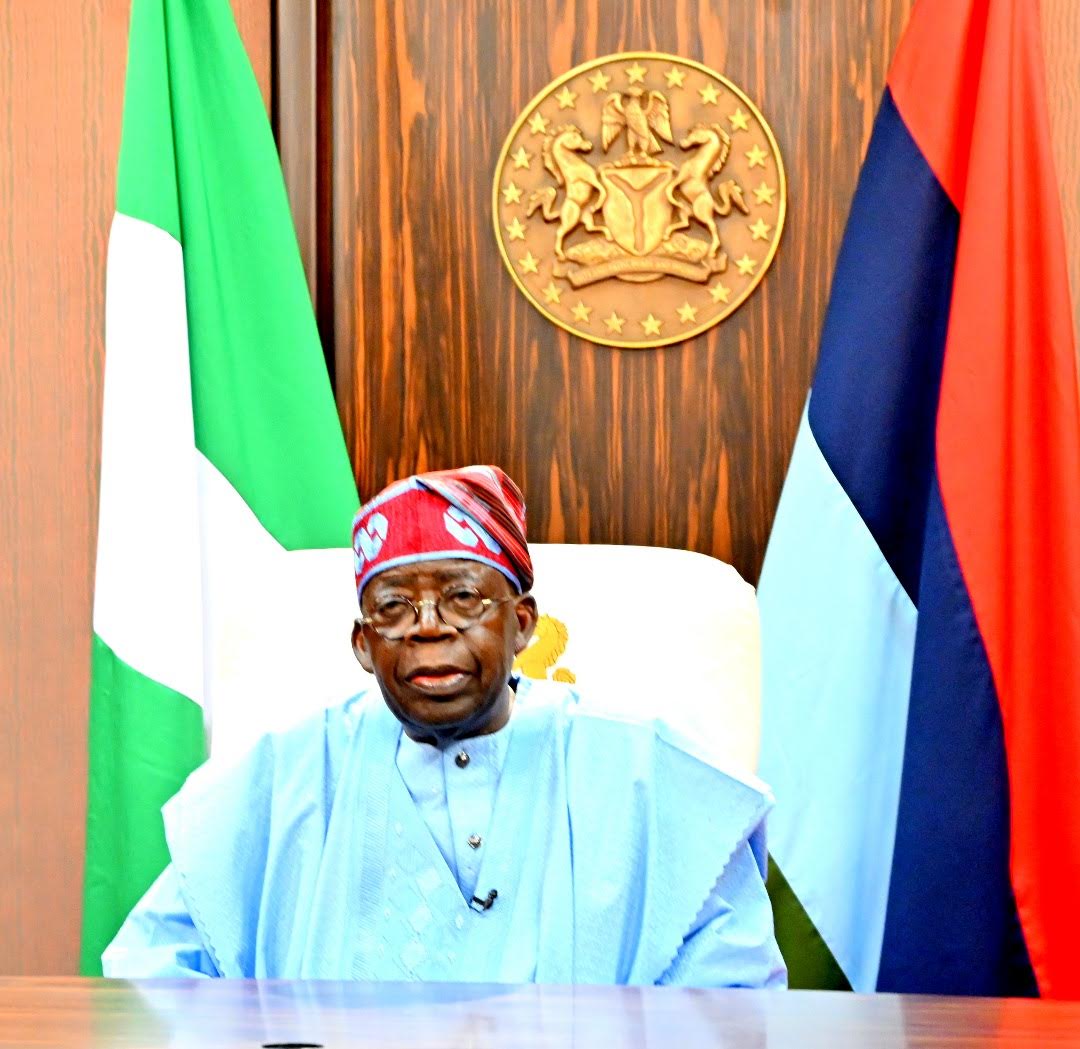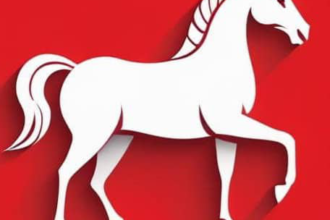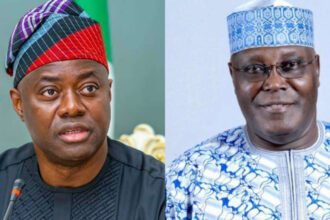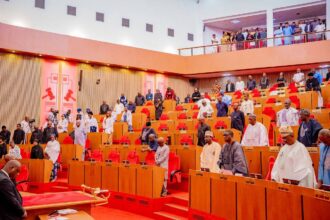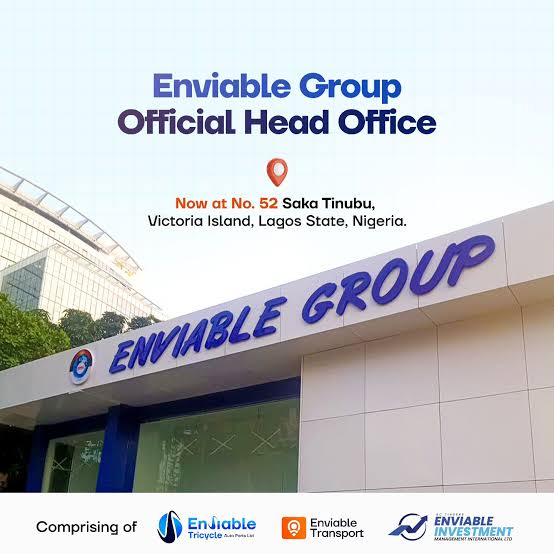
President Bola Ahmed Tinubu, GCFR, in his national broadcast to mark Nigeria’s 65th Independence Anniversary, delivered a message that blended acknowledgment of Nigeria’s struggles, celebration of its resilience, and a renewed call to hope and productivity. Speaking from the Presidential Villa, Abuja, the President reflected on the sacrifices of Nigeria’s founding fathers, reviewed his administration’s reforms since 2023, outlined progress across sectors, and reassured citizens that the nation had “turned the corner” towards recovery and prosperity.
Remembering the Journey Since 1960
The President began by paying tribute to Nigeria’s nationalists—Herbert Macaulay, Dr. Nnamdi Azikiwe, Sir Abubakar Tafawa Balewa, Chief Obafemi Awolowo, Sir Ahmadu Bello, Margaret Ekpo, Anthony Enahoro, Ladoke Akintola, Michael Okpara, Aminu Kano, Funmilayo Ransome-Kuti, and others—who fought for independence. He described them as visionaries who believed Nigeria’s destiny was to lead the black race as the world’s largest black nation.
Tinubu acknowledged that Nigeria had endured bitter trials: civil war, military dictatorships, political crises, and social upheavals. Yet, he stressed, the nation survived each storm with resilience and determination. “We continue to strive to build a more perfect union where every Nigerian can find purpose and fulfilment,” he declared.
Achievements Since Independence
Highlighting Nigeria’s growth since 1960, Tinubu noted:
-
Secondary schools grew from 120 in 1960 to over 23,000 by 2024.
-
Universities expanded from two in 1960 to 274 by 2024, alongside 183 Polytechnics and 236 Colleges of Education.
-
Advances in healthcare, infrastructure, IT, telecommunications, aviation, and financial services far surpassed the colonial era baseline.
He admitted progress has been uneven but urged Nigerians to celebrate how far the nation has come.
Economic Reforms and Progress
The President recalled the economic crisis his administration inherited in May 2023—crippled by fuel subsidies, multiple foreign exchange rates, and fiscal misalignment. Tinubu described the choice he faced: “continue business as usual and watch our nation drift, or embark on a courageous, fundamental reform path.”
His administration chose reform:
-
Subsidy Removal – ending corrupt fuel subsidies and freeing resources for education, healthcare, agriculture, security, and infrastructure.
-
Foreign Exchange Reform – eliminating multiple exchange rates and stabilizing the Naira.
-
Revenue Growth – non-oil revenue exceeded N20 trillion in 2025, hitting the year’s target by August.
-
Fiscal Health – debt service-to-revenue ratio fell from 97% to below 50%.
-
External Reserves – rose to $42 billion, the highest since 2019.
-
Tax Reforms – tax-to-GDP ratio climbed to 13.5%, with plans for further expansion.
-
Trade Surplus – five consecutive quarters of surplus, with non-oil exports rising to 48%.
-
Oil Production – rebounded to 1.68 million barrels/day, alongside renewed local refining.
-
Social Investment – N330 billion disbursed to 8 million poor households.
-
Infrastructure Expansion – rapid rail, road, and port projects, including Lagos-Calabar Coastal Highway and Kano-Katsina-Maradi Standard Gauge rail.
-
Investor Confidence – upgraded sovereign credit ratings and a booming stock market.
-
Monetary Policy – Central Bank slashed interest rates for the first time in five years.
Tinubu declared: “The worst is over. Yesterday’s pains are giving way to relief. Our economy is recovering fast, and reforms are delivering tangible results.”
Security Efforts
Acknowledging sacrifices by the armed forces, Tinubu praised their progress against Boko Haram in the North-East, IPOB/ESN in the South-East, and banditry in the North-West. He said peace had returned to many communities and thousands displaced had returned home. “We must continue to celebrate their gallantry and salute their courage on behalf of a grateful nation,” he urged.
Investing in Youth
Tinubu addressed Nigeria’s youth directly, describing them as “the greatest assets of this blessed country.” He outlined initiatives designed to empower them:
-
NELFUND – Over 510,000 students across 228 higher institutions have received loans worth N99.5 billion, with upkeep allowances of N44.7 billion.
-
Credicorp – N30 billion affordable loans for 153,000 Nigerians to finance vehicles, solar energy, digital devices, and housing upgrades.
-
YouthCred – Consumer credit extended to NYSC members for resettlement.
-
iDICE Programme – A multi-partner initiative to support innovation in digital technology and the creative economy.
He challenged young Nigerians to dream big, innovate, and expand the nation’s global presence in science, arts, sports, and creativity.
A Message of Hope
Tinubu candidly admitted that reforms had caused “temporary pains” through inflation and higher living costs. But he insisted that the alternative—economic collapse—was unacceptable. He reassured citizens that sacrifices were already yielding benefits.
“The true measure of success will not be in economic statistics but in the food on our tables, the quality of our children’s education, the electricity in our homes, and the security in our communities,” he said.
The President urged Nigerians to embrace productivity, patronize Made-in-Nigeria goods, pay taxes, and support national development. He highlighted reforms in passport processing as an example of efficiency, challenging states and local governments to replicate similar improvements.
Call to Unity and Productivity
The President ended his broadcast with a passionate appeal:
-
To build a Nigeria that produces more than it consumes.
-
To farm, build factories, and grow local industries.
-
To believe in Nigeria’s boundless potential once again.
“On this 65th Anniversary of our Independence, my message is hope and a call to action. With Almighty God on our side, I can assure you that the dawn of a new, prosperous, self-reliant Nigeria is here,” Tinubu concluded.
President Tinubu’s 65th Independence Anniversary address was both retrospective and forward-looking—a reminder of Nigeria’s trials and triumphs over 65 years and a roadmap for reform-driven recovery. With economic growth indicators improving, security gains being recorded, and youth empowerment initiatives underway, the President projected confidence in Nigeria’s future.
Yet his acknowledgment of present hardship and his call for collective sacrifice signaled realism. His message was clear: government reforms alone will not transform Nigeria. Citizens, states, and communities must rise to the challenge of productivity and national renewal.
Watch video

